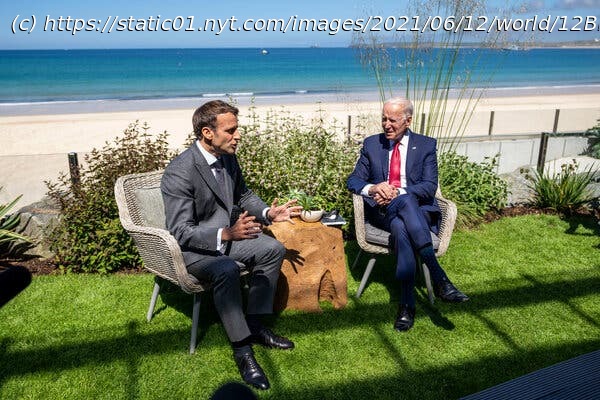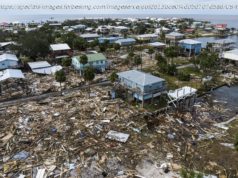The president urged the leaders of wealthy democracies to offer hundreds of billions in loans to developing nations in a direct challenge to Beijing’s Belt-and-Road Initiative.
President Biden urged European nations and Japan on Saturday to counter China’s growing economic and security influence by offering developing nations hundreds of billions in financing as an alternative to relying on Beijing for new roads, railways, ports and communications networks. It was the first time the world’s richest nations had discussed organizing a direct alternative to China’s Belt-and-Road Initiative, President Xi Jinping’s overseas lending and investment push, which has now spread across Africa, Latin America and, haltingly, into Europe itself. But the White House cited no financial commitments, and there is sharp disagreement among the United States and its allies about how to respond to China’s rising power. Mr. Biden has made challenging a rising China and a disruptive Russia the centerpiece of a foreign policy designed to build up democracies around the world as a bulwark against spreading authoritarianism. Beijing, for its part, has pointed to the poor U.S. response to the pandemic and divisive American politics — particularly the Jan.6 riot at the Capitol — as signs that democracy is failing. In size and ambition, the Chinese development effort far surpasses the Marshall Plan, the United States’ program to rebuild Europe after World War II. At the Group of 7 summit meeting, discussions on Saturday about how to counter it reflected the debate within the West about whether to regard China as a partner, competitor, adversary or outright security threat. It is far from clear that the wealthy democracies will be able to muster a comprehensive response. The plan described by the White House appeared to stitch together existing projects in the United States, Europe and Japan, along with an encouragement of private financing. A fact sheet distributed to reporters gave it a name, “Build Back Better for the World,” with roots in Mr. Biden’s campaign theme — shortened to B3W, a play on China’s BRI. It emphasizes the environment, anti-corruption efforts, the free flow of information and financing terms that would allow developing countries to avoid taking on excessive debt. One of the criticisms of Belt and Road is that it leaves the nations that sign on dependent on China, giving Beijing too much leverage over them. It was a sign of the growing concern about pervasive Chinese surveillance that the British hosts of this year’s G7 gathering cut off all internet and Wi-Fi links around the room where the leaders were meeting, leaving them disconnected from the outside world. The leaders largely agree that China is using its investment strategy both to bolster its state-owned enterprises and to build a network of commercial ports and, through Huawei, communications systems over which it would exercise significant control. But officials emerging from the meeting said Germany, Italy and the European Union were clearly concerned about risking their huge trade and investment deals with Beijing or accelerating what has increasingly taken on the tones of a new Cold War. Mr. Biden used the meeting to advance his argument that the fundamental struggle in the post-pandemic era will be democracies versus autocracies. The first test may be whether he can persuade the allies to reject participation in any projects that rely on forced labor. It is unclear, American officials said, what kind of language about rejecting goods or investments in such projects would be included in the meeting’s final communiqué, which will be issued on Sunday.






